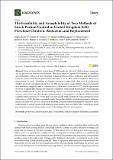The feasibility and acceptability of two methods of snack portion control in United Kingdom (UK) preschool children : reduction and replacement
Abstract
Large portions of high energy dense (HED) snacks are offered to children from a young age and are pervasive in our food environment. This study aimed to explore the feasibility, acceptability, and preliminary efficacy of two strategies of snack portion control: reduction and replacement. Forty-six mother-child dyads aged 22–56 months (36.6 ± 9.5 m, 48% female) completed a three-week intervention. In week 1 (baseline) no changes were made to the child’s diet; week 2 (acclimation) children received a standardised selection of HED snacks, and in week 3 (intervention) participants were randomly assigned to snack replacement (n = 24) or snack reduction (n = 22). Snack replacement involved swapping HED snacks for fruits and vegetables, whilst snack reduction involved reducing the size of HED snacks by 50%. Food and energy intake were measured using a weighed food diary for four consecutive days. Snack replacement resulted in more positive changes to children’s diets; vegetable intake increased (p < 0.01), and total daily energy intake decreased when compared to snack reduction (p < 0.05). Mothers expressed a more favourable attitude to snack replacement, although snack reduction was also well received by mothers. Despite increased preliminary efficacy of snack replacement on dietary intake, both strategies were feasible and acceptable. The current pilot study provides the necessary information to inform the design of future interventions.
Citation
Reale , S , Kearney , C , Hetherington , M , Croden , F , Cecil , J E , Carstairs , S A , Rolls , B & Caton , S 2018 , ' The feasibility and acceptability of two methods of snack portion control in United Kingdom (UK) preschool children : reduction and replacement ' , Nutrients , vol. 10 , no. 10 , 1493 . https://doi.org/10.3390/nu10101493
Publication
Nutrients
Status
Peer reviewed
ISSN
2072-6643Type
Journal article
Description
This work was supported by the BBSRC, Diet and Nutrition Research Industry Club [grant numbers BB/M027384/1].Collections
Items in the St Andrews Research Repository are protected by copyright, with all rights reserved, unless otherwise indicated.

